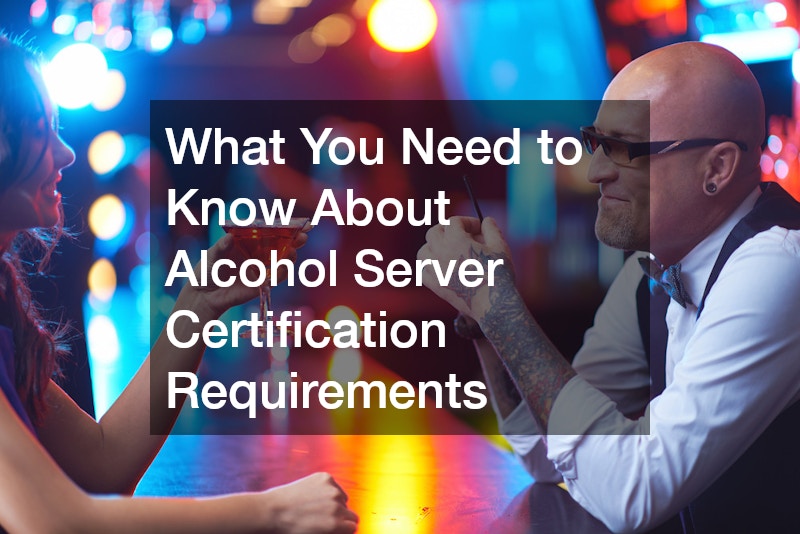Serving alcohol is not just about pouring drinks and keeping glasses full; it involves various responsibilities that require formal certification. For those looking to work in bars, restaurants, or any venue serving alcohol, understanding the intricacies of alcohol server certification is essential. This article delves into the importance, requirements, and procedural nuances of obtaining this vital qualification to ensure a career in responsible alcohol service.
The Importance of Certification
Alcohol server certification is a crucial requirement for anyone intending to work in the liquor service industry. It is not just a formality but a demonstrable commitment to handling alcohol responsibly.
By obtaining it, servers prove that they understand the legal implications of serving alcohol to patrons, protecting both themselves and their employers from potential legal issues. Many regions enforce this requirement to minimize alcohol-related incidents, protecting customers from over-serving and improper service. The credential serves as a tool for reducing legal liabilities while promoting safe consumption and responsible business practices.
The training covers a wide range of essential topics. Many programs focus on how to identify intoxication in patrons, understanding legislative guidelines, and recognizing fake identification. Servers are taught how to refuse service politely and effectively, an essential skill in a potentially confrontational situation. Furthermore, the courses often include training on emergency procedures and how to handle rowdy customers, ensuring that the server can maintain a safe environment for everyone. By covering these areas, the program ensures that servers are well-prepared for various scenarios they might encounter on the job.
Having certified staff is attractive to employers seeking to minimize risk and enhance customer service quality. Employers are increasingly prioritizing hiring personnel who have completed proper training due to the public’s growing awareness of responsible alcohol service. Certified servers often have greater confidence in their roles and can significantly contribute to the establishment’s reputation for enforcing ethical standards. The skills gained not only benefit servers in their immediate roles but also open pathways to advancement within the hospitality industry. Achieving this qualification equips individuals to provide a higher standard of service, benefiting both their careers and the businesses they work for.
Understanding the Certification Process
The process of obtaining this certification can vary significantly depending on the state or region. Generally, prospective servers need to enroll in a recognized training program that meets local requirements. These programs are often available online or in person and can range in duration from a few hours to several days. In some states, periodic renewal might be required, ensuring servers stay updated with changing laws and regulations. By complying with these requirements, servers not only become qualified but also demonstrate their commitment to ongoing professional development.
Training modules typically focus on three main components: applicable laws, safe serving practices, and customer management skills. Courses cover topics such as the local alcohol laws, consequences of breaking those laws, and ways to verify age and sobriety effectively. Furthermore, the practical components of these courses, including role-playing and case studies, enhance the learning experience by providing real-life scenarios that servers may face. The certification process may include tests or assessments that participants must pass to prove their knowledge and competency. This rigorous training ensures that servers can adequately handle their responsibilities, maintain a safe service environment, and mitigate any potential risks associated with alcohol service.
After completing the training, servers receive a certification card or proof of completion recognized by employers and state authorities. This documentation is often required before an individual can legally serve alcohol. Additionally, there are usually associated fees for training and certification, which can vary by the provider and location. Some businesses might cover these costs for their employees as part of their training protocols, while others may expect individuals to finance their certification. Despite these potential costs, the certification’s overall value outweighs the investment required, considering the career opportunities it opens up and the skills acquired.
The Necessity of Being Informed and Certified
This certification is an essential requirement for anyone looking to work in the alcohol service industry. It ensures that servers are knowledgeable about the law, ethical serving practices, and effective customer management techniques. By ensuring their team is certified, businesses not only uphold the law but also create a safe, reliable environment for their patrons.
Doing so protects the establishment from legal liabilities associated with improper service, such as serving minors or over-serving patrons, which can lead to severe consequences. The skills gained through certification also enhance servers’ confidence in handling their responsibilities and dealing with challenging situations. Potential employers value certified servers’ readiness to maintain professional and law-abiding premises, thus prioritizing them in hiring decisions.
For aspiring servers, seeking alcohol server certification is a proactive step in career development. It not only provides guardianship over one’s professional standing but also demonstrates a commitment to responsible service. Armed with the necessary training and credentials, certified servers contribute positively to the hospitality industry, promoting an atmosphere of safety and respect.


